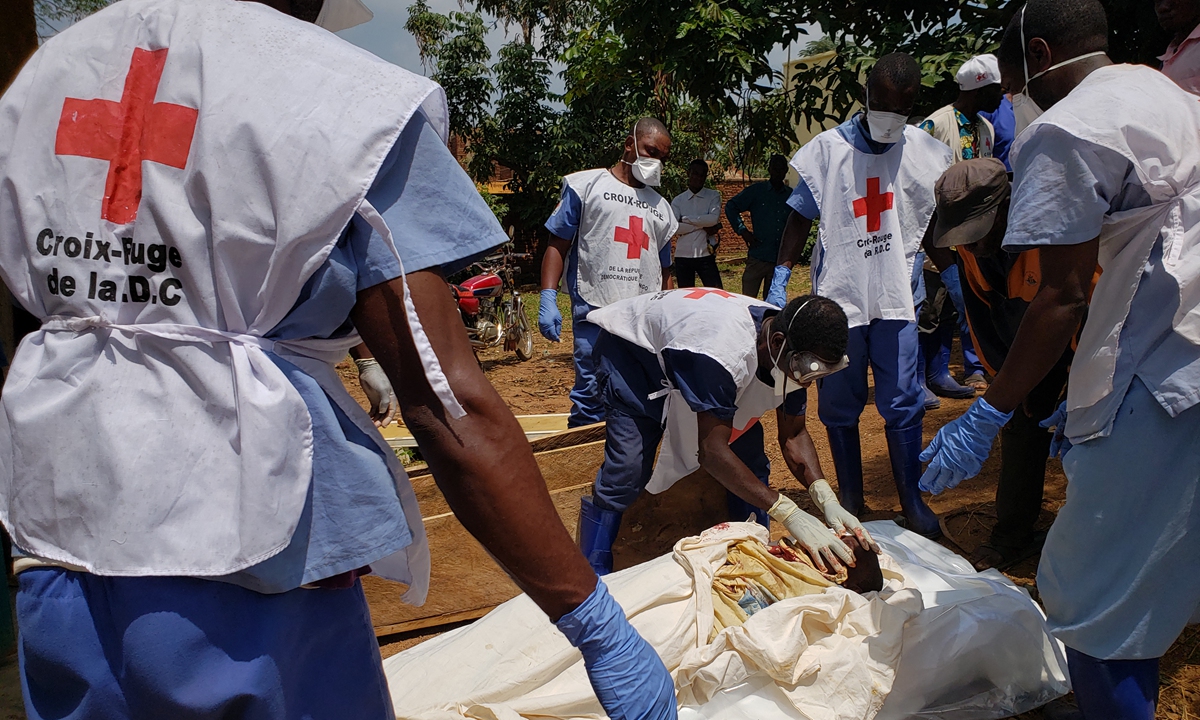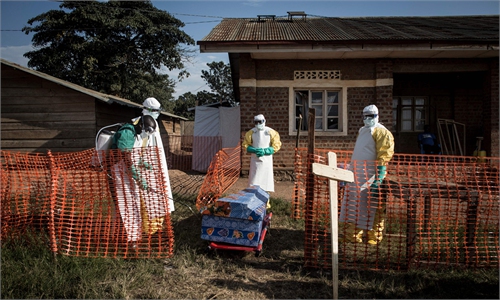
The Democratic Republic of the Congo's Red Cross members wearing gloves and masks handle dead bodies in Mangina on February 10, 2020. Photo: AFP
Congolese nurse Guilaine Masika Mulindwa is unfazed when crying babies drown out the voices of the Ebola survivors in her support group.For Mulindwa - herself a survivor - they are a powerful symbol of new life after the tragedy her community has lived through, and a way to challenge the stigma surrounding the deadly disease in the Democratic Republic of the Congo.
"Never miss any opportunity to go out with your babies in public, it will shake the community members out of their ignorance," Mulindwa told the meeting in her home city of Butembo in eastern Congo.
"Many still believe that we survivors can't have any more children, or that if we do, they'll be deformed. So the good health of your babies will speak for itself."
The 46-year-old head of the Butembo group thinks survivors have a key role to play in combatting the disease and the misinformation that surrounds it.
Butembo was one of the epicenters of the last major Ebola outbreak, which killed more than 2,200 people and infected over 1,100 others between 2018 and 2020.
The Ebola virus is spread through contact with body fluids and is highly contagious. It causes sudden fever, intense weakness, muscle pain and a sore throat that can progress to vomiting, diarrhea, and both internal and external bleeding.
It was the deadliest outbreak the country had seen, its duration lengthened by the difficulty of accessing virus hot spots in a region that has suffered decades of violence and instability.
Yet survival rates were higher than in previous outbreaks thanks to a new vaccine - health workers inoculated more than 400,000 people in Congo between 2018 and 2020 - and more effective treatments.
Now, many of those who survived the outbreak are seeking ways to ensure others in their community do not have to go through what they suffered.
They call themselves "les vainqueurs" - French for "the victors" - and have formed groups across the region affected by the outbreak, aiming to support each other and spread awareness of the disease.
Many of the Ebola survivors struggled to return to their former lives as they deal with the fear of relapse, long-term health issues, and stigmatization by their families and neighbors.
But they are living proof that Ebola can be overcome, and have a key role to play in preventing future outbreaks, said Abdoulaye Yam, Ebola incident manager for the World Health Organization (WHO) in the eastern Congolese city of Beni.
'Spread the message'
Nurse Muhiwa Maheshe Mululu, 56, runs a survivors' association that covers the eastern towns of Biakato and Mangina, where the 2018 outbreak started.
As a survivor himself, he now conducts outreach work in his community to raise awareness of the dangers.
But he said he was initially skeptical.
In the early days of the outbreak, Mululu hid people who had symptoms but who feared going into treatment centers because they saw them as places people went to die.
Then he fell sick.
When he was taken to the treatment center, his friends and neighbors burned tires in protest, demanding his release.
"When I started to get better, I thanked one of the doctors in the center. He smiled and told me that I should spread the message about what I had witnessed here to all those people who had burned tires," he recalled.
Fighting mistrust
Many of the survivors say they have faced isolation and been ostracized by their families and communities.
As a result, they have mobilized to support each other and groups like the one run by Mulindwa, the Butembo nurse, have sprung up in the towns and cities worst-hit by successive outbreaks of Ebola.
Mulindwa had to move house after her home was attacked and her children bullied because she had fallen sick.
"Psychologically, it greatly affected me ... without my family, I would be really lonely," she said.
Fellow Ebola survivor Merveille Agasa, 25, also had to move away from his home.
When he was discharged from the treatment center, his mother made him spend the night in an outbuilding.
At one point, he grew so desperate that he thought of joining the Congolese army or one of the armed groups that operate in the area, hoping for an early death.
But after he recovered he got work taking care of other survivors - something that brought him comfort.
When new Ebola cases were reported in October, Agasa and other survivors went door-to-door to tell people about the disease, collecting data about deaths and checking for possible sufferers who needed hospitalization.
Aftercare
Congo's government set up a program during the 2018-20 Ebola outbreak to provide aftercare for survivors, including psychological support and help with community reintegration.
But they could only access that help for 18 months and more than 1,000 of the survivors no longer receive any assistance.
Researchers point to a need for Ebola survivors to be more closely monitored to prevent reactivation and transmission of the virus and future outbreaks.
Given the limitations of the local authorities in a region beset by violence, instability and crushing poverty, the WHO's Yam said survivors' associations had increasingly stepped up.
He praised their work in persuading people to cooperate with decontamination, monitoring and vaccination programs.
But the survivors' groups cannot do everything.
On the day of a recent survivors' meeting in Beni, the community had been roiled by reports of fresh cases of Ebola, ensuring a higher than usual turnout.
As participants gathered outside the meeting room, health workers wearing full biohazard suits, goggles and gloves filed past. The body of the latest victim was being moved to a nearby cremation spot.
Fearing they would be treated with renewed suspicion, survivors called for the government to send a doctor to explain to the community why the disease had returned.
Reuters

